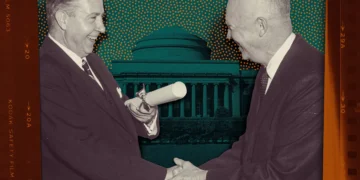In the ever-evolving world of finance, it’s no surprise that biases play a significant role in decision-making. But what may come as a surprise is that even highly educated and experienced professionals, such as professors of finance, are not immune to these biases. In a recent Social Science Bites podcast, Alex Edmans, a professor of finance at London Business School and author of the newly released book “May Contain Lies: How Stories, Statistics, and Studies Exploit Our Biases – And What We Can Do About It,” sheds light on the persistence of confirmation bias in the field of finance.
Confirmation bias, as defined by Edmans, is the tendency to seek out information that confirms our pre-existing beliefs and to discredit information that contradicts them. This bias can be seen in both individuals and groups, leading to flawed decision-making and hindering progress and innovation. In the podcast, Edmans discusses how this bias is prevalent not only in the general public but also among highly educated individuals, such as professors of finance.
As a professor of finance himself, Edmans is well aware of the impact of biases in the field. He explains that confirmation bias can manifest in various forms, such as cherry-picking data, relying on anecdotal evidence, and even seeking out information that supports our beliefs while ignoring conflicting evidence. This can lead to misguided decisions and missed opportunities in the world of finance.
But why do even highly educated individuals fall prey to confirmation bias? Edmans believes that it is a result of the way our brains are wired. Our minds have evolved to look for patterns and connections, and we often unconsciously seek out information that supports our beliefs to rationalize our decisions. In the fast-paced and competitive world of finance, where decisions need to be made quickly, this bias can be particularly dangerous.
However, Edmans is quick to emphasize that confirmation bias is not a sign of incompetence or lack of intelligence. In fact, he points out that it is a natural human tendency that we all possess. But what sets successful individuals apart is their ability to recognize and overcome this bias. In his book, “May Contain Lies,” Edmans delves into the various ways in which we can combat confirmation bias and make better decisions.
One of the key ways to combat confirmation bias, according to Edmans, is to actively seek out opposing viewpoints and evidence. By exposing ourselves to different perspectives, we can challenge our preconceived notions and make more informed decisions. This can be particularly useful in the field of finance, where market trends and data can often be complex and contradictory.
Another effective way to combat confirmation bias is by actively seeking out feedback and being open to criticism. As humans, we tend to take any criticism of our beliefs as a personal attack, but Edmans suggests that we should treat it as an opportunity to learn and grow. By actively seeking feedback from others and being open to constructive criticism, we can expand our perspectives and make more well-rounded decisions.
In addition to these practical steps, Edmans also emphasizes the importance of self-reflection and mindfulness. By being aware of our biases and actively challenging them, we can make a conscious effort to overcome them. This requires us to be honest with ourselves and admit when our beliefs may be clouding our judgment.
Edmans’ insights on confirmation bias are not limited to the field of finance but can be applied to various aspects of our lives. In today’s digital age, where information is readily available at our fingertips, it is more important than ever to be mindful of our biases and actively seek out opposing viewpoints.
As the podcast draws to a close, Edmans leaves us with a powerful message – biases are a natural part of our human nature, but it is our responsibility to be aware of them and take steps to overcome them. In the rapidly changing world of finance, where decisions have far-reaching consequences, it is crucial to recognize and combat confirmation bias to make informed and effective decisions.
In conclusion, Alex Edmans’ insights on confirmation bias serve as a reminder that even highly educated individuals are susceptible to biases. However, by actively seeking out opposing viewpoints, being open to feedback, and practicing self-reflection, we can overcome these biases and make more informed decisions. His book, “May Contain Lies,” is a valuable resource for anyone looking to understand and combat confirmation bias. As the field of finance continues to evolve, it is essential to be mindful of our biases and make a conscious effort to make unbiased decisions.




